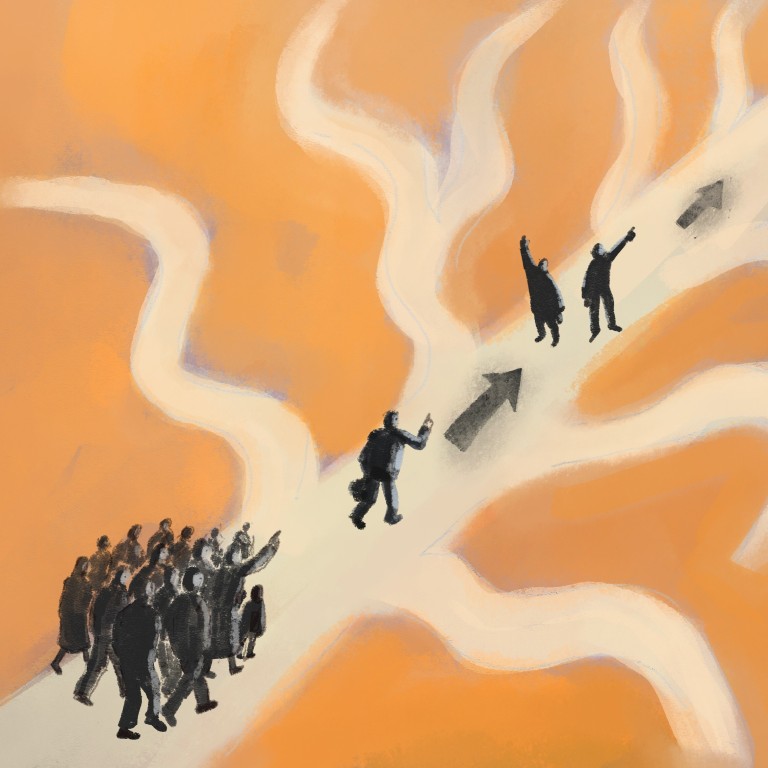
Hong Kong patriot games: who is loyal enough in the eyes of Beijing and can critics survive the system?
- Catchphrase ‘patriots governing Hong Kong’ is gaining currency amid city’s politically fractured landscape in the wake of the Occupy protests and 2019’s social unrest
- Pundits say changes in education sector, opportunities for youth and even a revamp to political system may be needed for slogan to take hold
In the first of a two-part special, the Post looks at the meaning and implications of a political catchphrase “Patriots governing Hong Kong” now gaining currency.
On most weekends, the Democratic Alliance for the Betterment and Progress of Hong Kong (DAB) hosts press conferences on an eclectic range of concerns, from supermarket prices to investment scams. But the media gathering it held last Sunday was altogether different.
Six members of the city’s largest pro-Beijing political party posed for a photo on January 31 as they launched an ambitious new campaign to “reform and transform Hong Kong”.
Their main goal now: to ensure “patriots govern Hong Kong”.
The DAB said it would start by recruiting more patriots. It would also seek reforms in the education system and youth policies to raise a generation of patriots that were skilled, talented and aware of global realities to lead society. The most important prerequisite is that these young people must love Hong Kong and the nation.
Is this mission impossible given how young people formed the backbone of the protest movement in 2019?
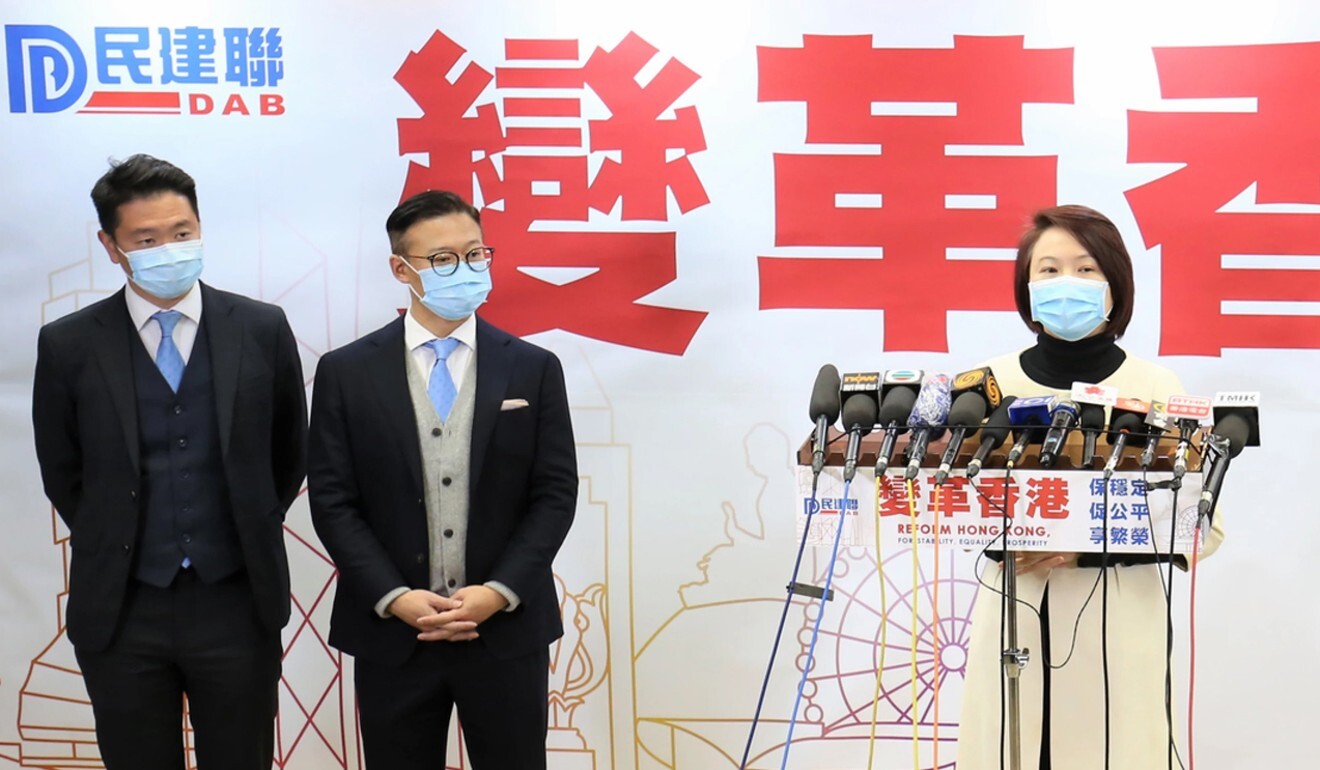
The party admitted it was not its job alone to reform society. The government had to step up to solve deep-seated problems among youth that had curdled into discontent and distrust.
“They need help with their studies, employment, starting their businesses and home ownership,” said party vice-chairman Gary Chan Hak-kan as he expanded on the grooming of patriots.
Watchers of Hong Kong politics would be forgiven for feeling a sense of deja vu over the DAB’s repeated use of the phrase “patriots governing Hong Kong”. Indeed, it has long been in the lexicon of the city’s ruling class. But it is only in recent months that the mantra has returned to prominence.
The phrase has antecedents in the lead-up to the 1997 handover when Hong Kong returned to Chinese rule from the British.
Such actions from the bloc, along with its strategy to seize control of the city’s legislature and potentially paralyse the government, were the last proverbial straw on China’s back, they said.
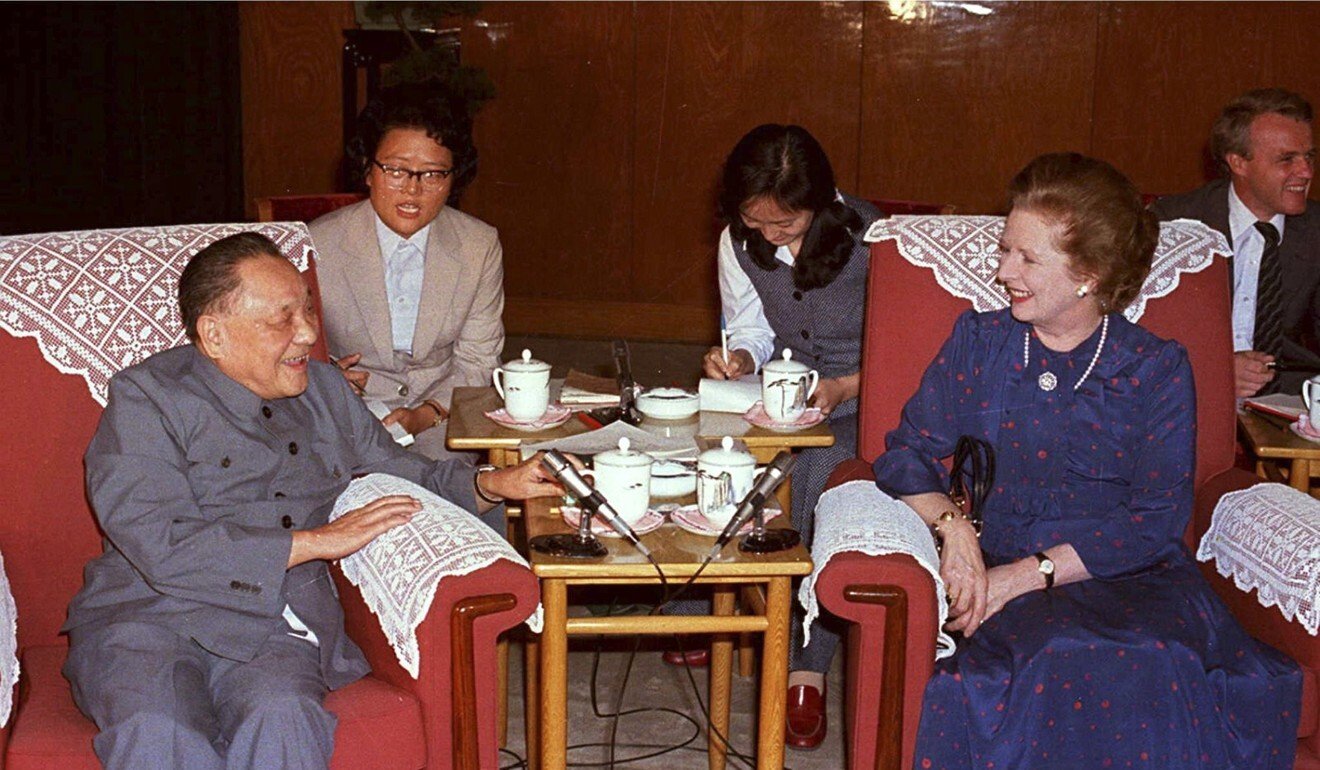
An old catchphrase regains currency
The phrase was first used by late Chinese paramount leader Deng Xiaoping, who said in 1984 that “patriots governing Hong Kong” must undergird the “one country, two systems” principle for the city after its return to Chinese sovereignty.
“The bottom line of ‘Hong Kong people governing Hong Kong’ is that patriots must form the main body of those who govern the city,” Deng told a delegation of Hong Kong business and political leaders in Beijing, six months before the signing of the Sino-British Joint Declaration that paved the way for the handover.
Deng defined a patriot as “one who respects the Chinese nation, sincerely supports the motherland’s resumption of sovereignty over Hong Kong, and wishes not to impair Hong Kong’s prosperity and stability”.
But these fundamental principles were never advocated aggressively in the years immediately after the handover. They would occasionally resurface during discussions about political reform, sometimes in the guise of a slight variation, such as “love the country, love Hong Kong”.
For the most part, China was content to bide its time, let things remain as they were, whether it was in dealing with the rowdy opposition or the freewheeling media, or even the city’s reputation as a place for foreign spies. Its focus was on its own opening up and economic development. It needed Hong Kong as its gateway to the world, said Lau Siu-kai, vice-president of the Chinese Association of Hong Kong and Macau Studies. He said that when Deng first talked about patriots running Hong Kong in the 1980s, China was a relatively weak and backward country, hardly in a position to drive a hard bargain on who would form the future establishment in Hong Kong.
In 1979, the nation’s GDP was US$178 billion, and Hong Kong’s was US$23 billion. By 2019, the city’s economy had grown to US$366 billion, but China’s that same year was a massive US$14.3 trillion.
Even if China remained poor to this day, it still would have taken action to protect its national security
“When Hong Kong was just returned from British rule, Beijing was worried about instability in the sentiment of Hong Kong’s people, and their lack of confidence in the city’s future,” said Lau, a sociologist who headed a local government think tank, the Central Policy Unit, from 2002 to 2012.
After the handover, central authorities worked with the pro-Beijing camp to galvanise their support for the city’s government.
During those early years, Beijing also maintained a relatively cordial relationship with the local opposition camp. When democracy icons such as Szeto Wah fought for their ideals, their loyalty to the country and that of other opposition members were never cast in doubt.
Lau said Beijing also often invited opposition lawmakers to official receptions and talks, such as those dealing with political reform in 2010.
“Even if China remained poor to this day, it still would have taken action to protect its national security,” he said.
When a son threatens to burn the house down, he can’t blame the parents for cutting ties
According to another DAB vice-chairman, Brave Chan Yung, Beijing had reached the limits of its patience with the opposition camp, just as a father would be disappointed with a rebellious son.
“When the opposition kept challenging Beijing’s bottom line and started to destroy ‘one country, two systems’, it was natural for mainland officials to be fed up.”
“When a son threatens to burn the house down, he can’t blame the parents for cutting ties,” he said.
Beijing’s top man in Hong Kong praises police as ‘loyal guardians’
However, after the prolonged protests of 2019 over the withdrawn extradition bill morphed into a wider anti-government, anti-China movement, Beijing decided it had to spell out the red lines in the clearest of terms.
Lau pointed to a white paper the State Council released in June 2014, spelling out the “accurate” understanding of one country, two systems. The document emphasised the importance of “insisting on Hong Kong people governing Hong Kong, with patriots with the main body” of administrators.
The Occupy movement that emerged three months later only reinforced in Beijing’s eyes the need to press on with this agenda, he said.
“The central government felt that foreign forces were involved and had combined with local opposition forces to destroy the city’s governance,” Lau said.
Yet, the central government remained tolerant after the Occupy protests died down, according to Priscilla Leung Mei-fun, who advises Beijing on issues related to the city’s mini-constitution on the Basic Law Committee.
“[Beijing] was very restrained and hoped that Hong Kong’s top officials could focus on livelihood issues instead,” she said, referring to the government’s efforts to improve the political atmosphere after the political reform package was rejected in 2015.
Lau noted that after the oath-taking saga, Xi and other state leaders began to stress the importance of patriotism and national security in Hong Kong.
Speaking at Hong Kong leader Carrie Lam Cheng Yuet-ngor’s inauguration in July 2017, Xi emphasised national sovereignty came first in the one country, two systems principle. At the opening of the party’s 19th congress three months later, he called for greater patriotism in the city.
“We must insist on having patriots as the main body of Hong Kong people governing Hong Kong,” Xi said, echoing Deng’s words.
Leung, a pro-establishment legislator who witnessed the oath-taking saga, said it was nothing compared with the anti-government protests of 2019.
In the social unrest, which only died down when the Covid-19 pandemic broke out in January last year, young radical protesters hurled petrol bombs at businesses seen as friendly to mainland China and desecrated the national flag at public venues. Pan-democrat lawmakers joined localist activists in calling for the United States and other Western countries to sanction local and Beijing officials.
When the party’s fourth plenum ended in October that year, it issued a document vowing to establish “a sound legal system and enforcement mechanism for safeguarding national security” in Hong Kong.
From students to politicians
While the government under the city’s first chief executive Tung Chee-hwa introduced liberal studies in 2000 as a key subject to produce better students, it later turned out to be a source of frustration for the pro-establishment camp which blamed it for feeding incendiary ideas of protest and violence.
Critics have also blamed the colonial era education curriculum that assiduously tried to dispel the idea of Hong Kong people being Chinese nationals.
Hong Kong civil servants should not publicly criticise government, minister warns
Given the failure in the past to transform the city’s young, what is giving the DAB confidence that it can make a breakthrough this time?
While the effort on students might take a long time to reap results, the more immediate impact of ensuring that the phrase “patriots governing Hong Kong” is realised will mean a revamp of the political system. Pundits said Beijing was determined to create a “loyal” opposition after draining the bloc of “traitors” who had asked for sanctions. Asked if the national security law had already made sure of that in outlawing foreign collusion, Lau said it was only the first step.
“Lawmakers can be disqualified over collusion under the national security law and the NPCSC’s recent decision, but it was still unclear how other public officers should bear allegiance to Hong Kong,” he said.
Lau was referring to the standing committee’s resolution last November stating local lawmakers would lose their Legco seats if they were deemed to have engaged in acts endangering national security.
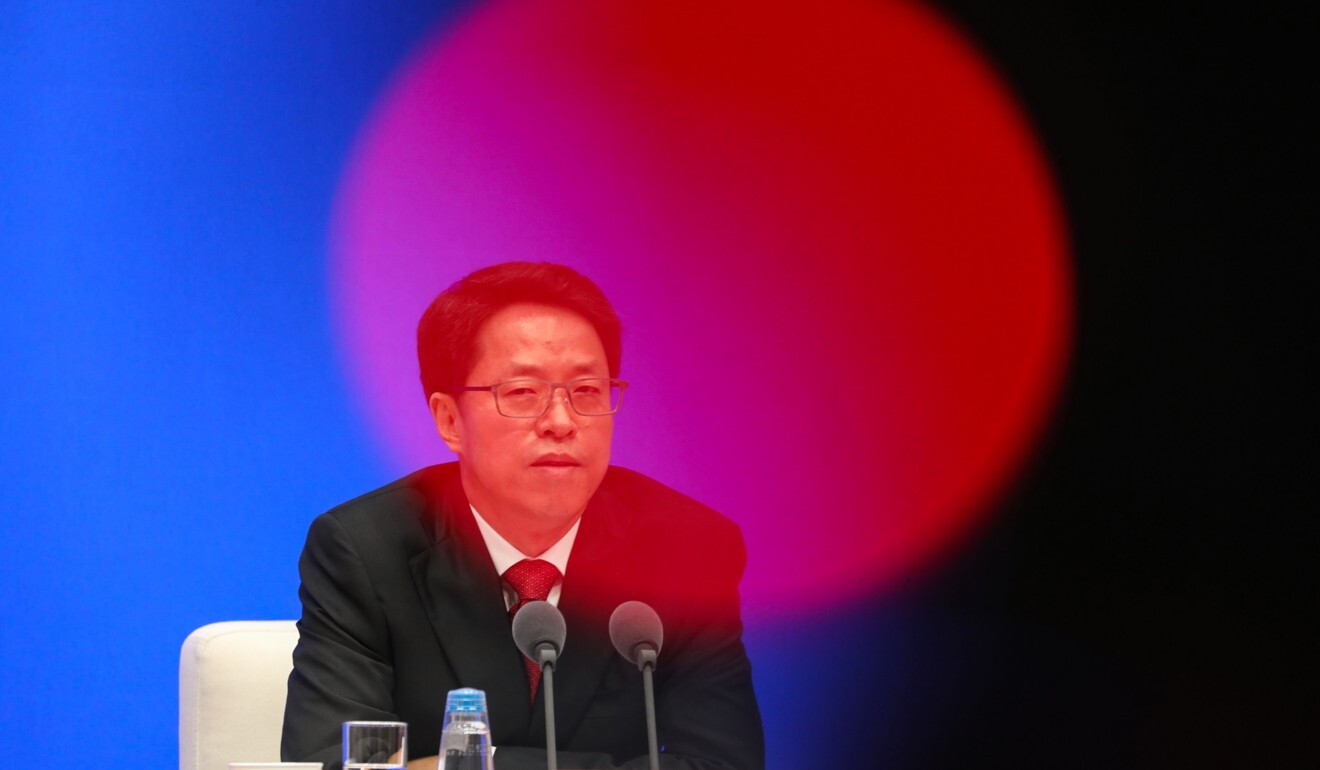
On why Beijing needed to act decisively now, Lau said: “For the central government, as long as patriots are not in the driver seats of Hong Kong politics, the one country, two systems principle has yet to be implemented comprehensively and accurately.”
Teachers do not govern Hong Kong, but if they conspire to overthrow the government, what kind of students and young people would they produce?
Other pro-establishment figures also believed that as “patriots governing Hong Kong” became the new political slogan for the administration, a series of legislative and policy moves could be expected to ensure public officers, including district councillors, civil servants, or even teachers and government advisers, uphold the Basic Law and pledge allegiance to the city.
“Amending the relevant local laws would be the most important task,” said Ip Kwok-him, an adviser on the city leader’s de facto cabinet and a veteran delegate to the National People’s Congress.
“But we also need to push our education system back on the right track … Teachers do not govern Hong Kong, but if they conspire to overthrow the government, what kind of students and young people would they produce?”
But Brave Chan said such reforms were unlikely to affect non-governing sectors such as educators, academia and media.
“Public broadcaster RTHK is already made up of civil servants, who have to declare their allegiance to Hong Kong,” he said. “Hong Kong universities are also internationalised. But while it’s hard to ask everyone to bear allegiance to China, university chiefs have a responsibility to protect the city’s stability.”
Priscilla Leung, who chairs Legco’s education panel, said as long as the local government amended the oath and district council ordinances, it would have fulfilled Xi’s requirements.
“Heads of public bodies would need to be patriots as well … But educators do not govern Hong Kong, so I think they just need to be law-abiding, just like other residents,” she said.
Leung also believed that dissident voices would continue to be tolerated.
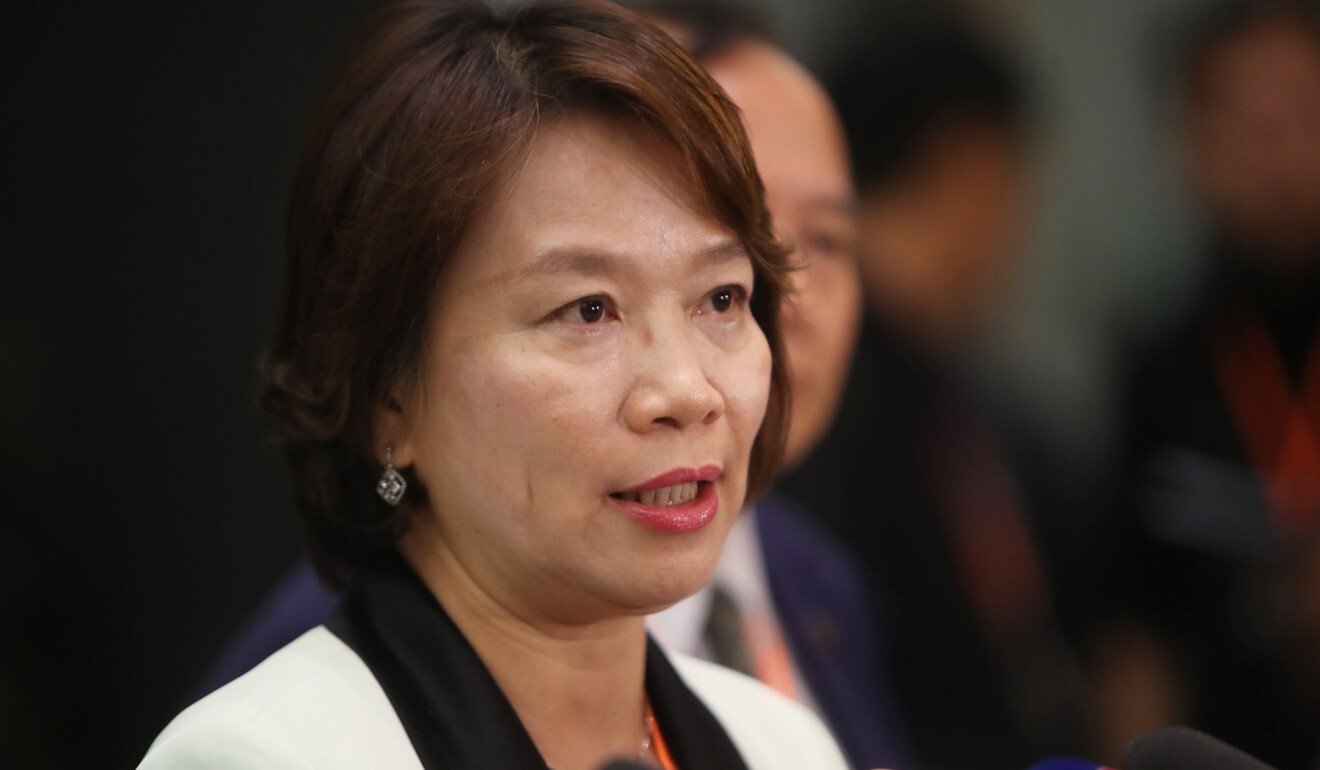
“Opposition voices will be allowed, as long as they do not try to overthrow one country, two systems. They must also guide their supporters not to go beyond the bottom line of the framework,” she said.
Agreeing, Ip said: “The central government still wants to attract more people to become public officers who understand and are committed to the country.”
But Democratic Party leader Lo Kin-hei said the problem with Beijing’s insistence on patriots ruling the city was that it was not up to Hongkongers to decide on the definition of a patriot.
“The central government can arbitrarily define who are patriots and who are not, just like the moving red line it imposed on the city. Perhaps one day even the DAB is not considered patriotic enough in the eyes of Beijing,” he said.
Many of his party colleagues, he added, saw themselves as patriots in trying to democratise the city and the country. “They genuinely care about the country and hope it will improve through democratisation, but this is seen by Beijing as an attempt to seize power,” he said.
Former DAB chairman Tam Yiu-chung, a delegate to the NPCSC, argued that one could be an opposition politician and still be considered a patriot.
“People talked about ‘loyal opposition’ … your heart has to be dedicated for the success of a policy, not to destroy everything. If you just oppose everything, that’s unacceptable.”
Can patriots criticise Beijing?
Critics questioned if the definition as set out by Deng in 1984 would narrow over time to just suit what the NPCSC of the day demanded, such as, for example, supporting wholeheartedly the dream of Chinese rejuvenation. But Tam dismissed such concerns.
He urged critics to take reference from Article 104 of the Basic Law which reflected the spirit and substance of what Deng meant by patriots ruling the city.
“Article 104 requires officials, lawmakers and judges to uphold the Basic Law and pledge allegiance to Hong Kong as a special administrative region of China. It’s also a basic requirement for patriots to abide by the city’s laws, including the national security law, and support one country, two systems.”
Asked if patriots could freely criticise the central and local governments without their loyalty being questioned, Tam said: “Yes, you can criticise if you want the government to improve. As a NPCSC delegate, I have made a lot of suggestions on how certain mainland legislations can be improved.”
But the catchphrase would redefine not just the role of the opposition, Ip said, but also how the pro-establishment camp sought to prove its relevance in the changed political landscape.
There could be intra-camp contest to prove one’s patriotism, he said. “But it would be a positive kind of competition,” he added.
But Lau Siu-kai saw danger ahead, especially if the pro-establishment camp no longer had a credible opposition to unite against.
Hong Kong liberal studies: spotlight on national security, lawfulness, patriotism
“Pro-establishment politicians could be challenged by new patriotic forces within the camp … In the face of competition, they could be worried whether they are still up to the standard of patriotism,” he said.
A pro-Beijing leader admitted a focus on patriots governing Hong Kong could leave pro-establishment politicians, regardless of their age, worrying about proving their loyalty.
The insider said the bloc’s leaders were unlikely to put an end to such internal competition, as long as the rivalry highlighted the importance of national sovereignty and security.
“The activists from the other side of the camp were also very vocal, and our supporters have blamed us for being too moderate when people are jeopardising one country, two systems,” he said.
For now, DAB activists said they were not too worried about competition in their own camp. They singularly focused on expanding their reach. Whether it was the opposition or young people, they need not identify with the Communist Party to be deemed patriots; they just needed to show they cared about the city and country, even if they chose to be critical, Brave Chan said. “They can criticise the country and suggest improvements, but we hope that they won’t curse China,” he said.

